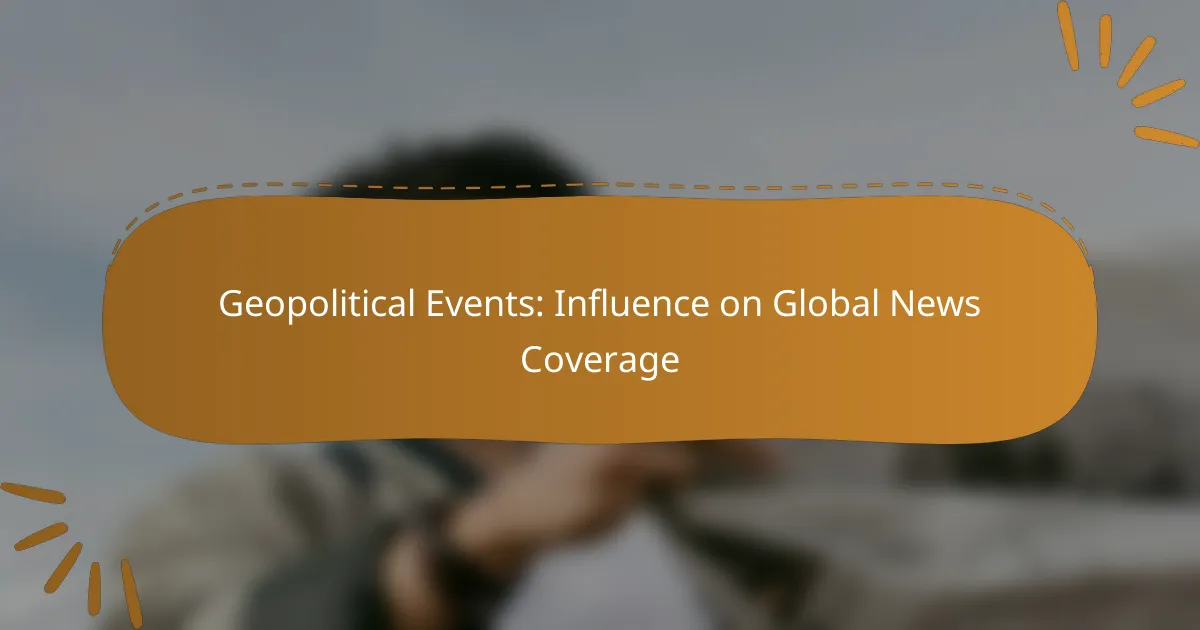Geopolitical events play a crucial role in shaping global news coverage, influencing which stories are highlighted and the narratives that emerge. Factors such as government censorship, media ownership, and public sentiment further dictate how these events are reported and perceived across different regions, reflecting diverse cultural and historical contexts. As a result, the portrayal of conflicts and crises can vary significantly, impacting international discourse and public understanding.
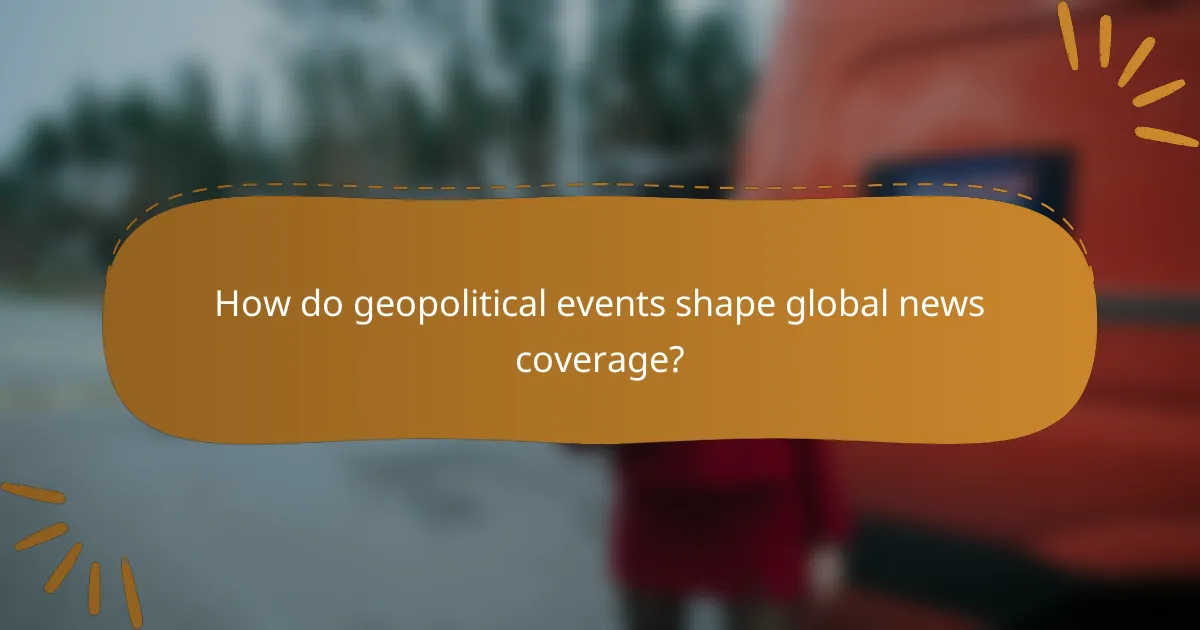
How do geopolitical events shape global news coverage?
Geopolitical events significantly influence global news coverage by determining which stories receive attention and how they are framed. The nature of these events can lead to shifts in media narratives, impacting public perception and international discourse.
Impact of conflicts on media narratives
Conflicts often dominate news cycles, shaping narratives that reflect the interests of various stakeholders. Media outlets may emphasize certain aspects of a conflict, such as humanitarian crises or military actions, to align with their audience’s perspectives or political affiliations.
For instance, during armed conflicts, visuals of destruction and suffering can evoke emotional responses, leading to increased viewer engagement. This focus can sometimes overshadow other important issues, such as diplomatic efforts or economic impacts.
Influence of international relations on reporting
International relations play a crucial role in how news is reported, as alliances and tensions between countries can dictate the framing of stories. Media coverage may vary significantly depending on the relationships between the countries involved, often reflecting the biases of the reporting nation.
For example, a country with strong ties to a particular government may present that government’s actions in a more favorable light, while portraying opposing views negatively. This selective reporting can shape public understanding and influence policy discussions.
Case study: Ukraine-Russia conflict
The Ukraine-Russia conflict serves as a prominent example of how geopolitical events shape news coverage. Since the onset of the conflict, media narratives have focused on themes of sovereignty, aggression, and international law, often highlighting the perspectives of Ukraine and its allies.
Coverage has varied widely, with Western media generally portraying Ukraine as a victim of unprovoked aggression, while some outlets in other regions may emphasize historical ties and grievances. This divergence illustrates how geopolitical interests can lead to contrasting narratives in global news.
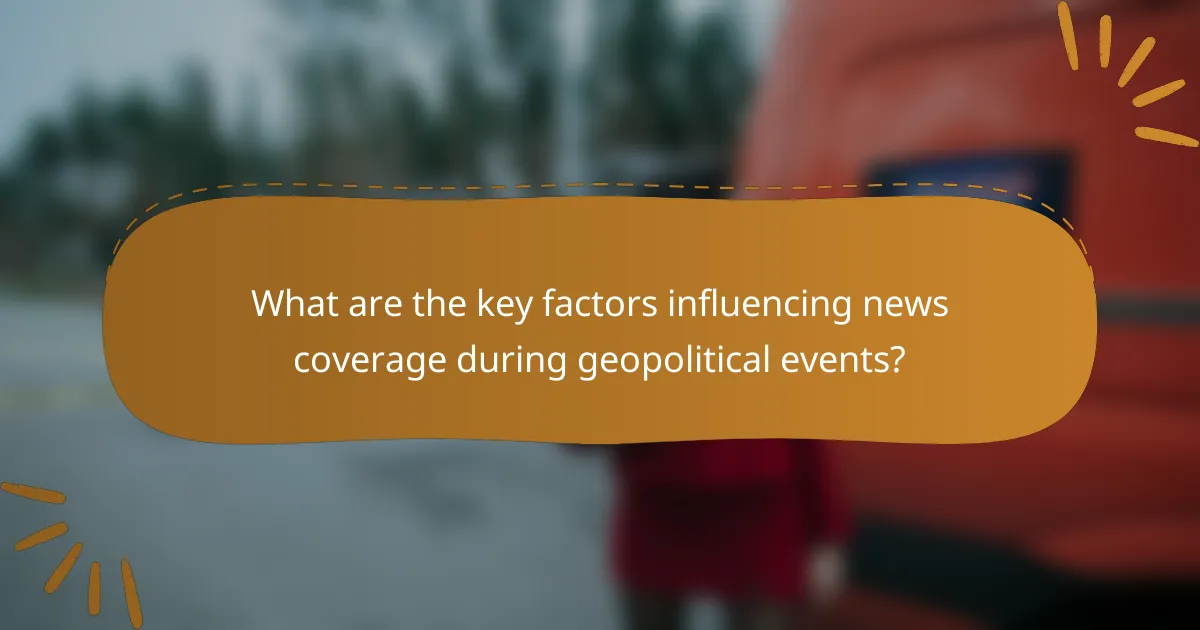
What are the key factors influencing news coverage during geopolitical events?
Key factors influencing news coverage during geopolitical events include government censorship, media ownership, and public sentiment. Each of these elements shapes how information is presented and perceived by audiences worldwide.
Government censorship and propaganda
Government censorship significantly impacts news coverage by controlling the flow of information. In many countries, authorities may restrict access to certain news sources or manipulate narratives to align with political agendas.
For instance, during conflicts, governments might limit reporting on military actions or civilian casualties to maintain public support. This can lead to a skewed perception of events, as only state-approved information is disseminated.
Media ownership and bias
Media ownership plays a crucial role in shaping news narratives, as outlets often reflect the interests of their owners. When a few corporations control multiple media channels, this can lead to a homogenization of viewpoints and a lack of diverse perspectives.
For example, if a media conglomerate has ties to political parties, its coverage may favor those parties, influencing public opinion and understanding of geopolitical events. Audiences should be aware of these biases when consuming news.
Public sentiment and audience demand
Public sentiment and audience demand directly influence news coverage, as media outlets often tailor content to attract viewers. During geopolitical events, there is typically a heightened interest in specific topics, such as national security or humanitarian crises.
As a result, news organizations may prioritize sensational stories or emotional appeals to engage their audience. This can lead to a focus on dramatic events while neglecting more complex underlying issues, which are equally important for understanding the situation.
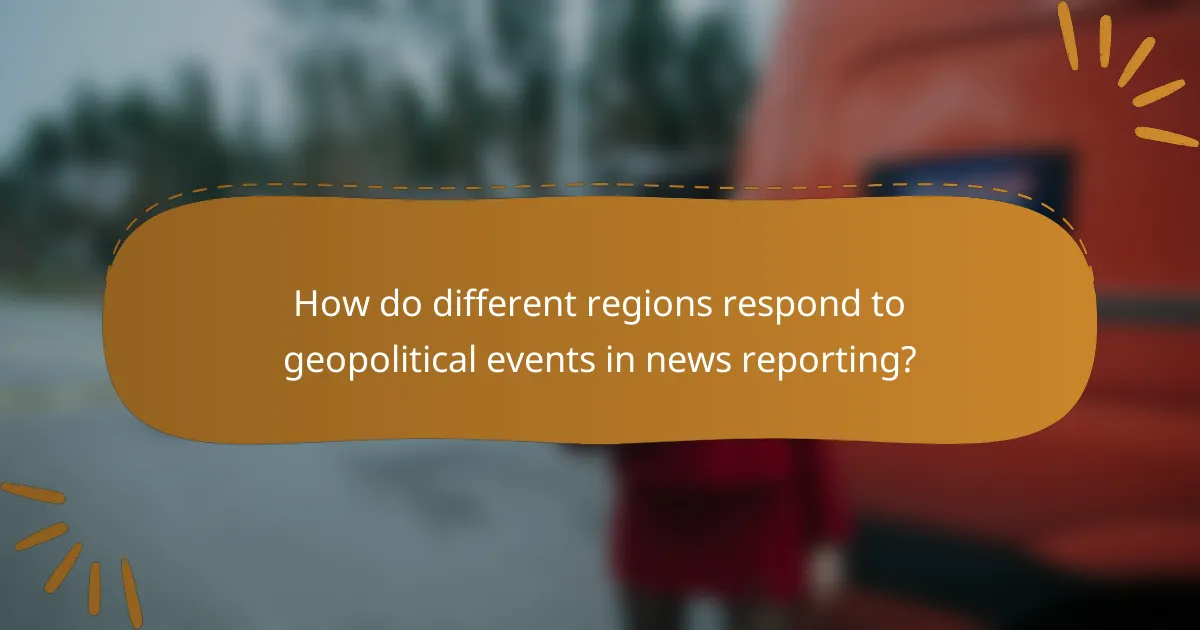
How do different regions respond to geopolitical events in news reporting?
Different regions exhibit distinct approaches to reporting on geopolitical events, influenced by cultural, political, and historical contexts. These variations shape how audiences perceive conflicts and crises around the world.
US media coverage of Middle Eastern conflicts
US media often emphasizes the strategic and political implications of Middle Eastern conflicts, focusing on issues like terrorism, oil interests, and military involvement. Coverage may vary significantly between outlets, with some prioritizing sensationalism while others aim for in-depth analysis.
For instance, major networks like CNN and Fox News might present contrasting narratives on the same event, reflecting their editorial slants. Audiences should be aware of these biases and seek diverse sources for a more comprehensive understanding.
European perspectives on Eastern European crises
European media coverage of Eastern European crises tends to highlight humanitarian aspects and the impact on EU stability. Countries bordering conflict zones, such as Poland and Hungary, may provide more immediate and localized reporting compared to Western European outlets.
In addition, European news organizations often focus on the implications for European security and migration, reflecting the continent’s interconnectedness. This can lead to a more nuanced portrayal of events, emphasizing both geopolitical and social dimensions.
Asian media narratives on global events
Asian media narratives often reflect regional interests and historical relationships, with countries like China and India presenting unique viewpoints on global events. Coverage may prioritize economic impacts, regional stability, and national sovereignty over Western-centric narratives.
For example, Chinese state media may frame international conflicts in terms of national unity and development, while Indian outlets might focus on diplomatic relations and trade implications. Understanding these perspectives is crucial for grasping the broader geopolitical landscape.

What role do social media platforms play in shaping news coverage?
Social media platforms significantly influence news coverage by enabling rapid dissemination of information and allowing users to participate in news creation. They serve as both a source of news and a medium for public discourse, impacting how stories are reported and perceived globally.
Real-time reporting and citizen journalism
Social media facilitates real-time reporting, allowing individuals to share news as events unfold. Citizen journalism has emerged as a powerful force, where ordinary people document and report on local and global events, often filling gaps left by traditional media outlets.
This immediacy can lead to a more diverse range of perspectives but may also result in the spread of misinformation. Users should verify sources and cross-check facts before sharing content to maintain credibility.
Influence of algorithms on news visibility
Algorithms on social media platforms determine which news stories gain visibility, often prioritizing content that generates engagement. This can create echo chambers, where users are exposed primarily to viewpoints that align with their own, potentially skewing public perception of events.
To counteract this, users should actively seek out diverse sources and perspectives. Engaging with a variety of content can help mitigate the effects of algorithmic bias and promote a more balanced understanding of news coverage.
Case study: Twitter during Arab Spring
During the Arab Spring, Twitter played a crucial role in shaping news coverage by providing a platform for activists to share real-time updates and mobilize support. The hashtag system allowed for the rapid spread of information, making it easier for users to follow developments across different countries.
This case illustrates the power of social media in amplifying voices that may be overlooked by traditional media. However, it also highlights challenges, such as the risk of misinformation and the potential for government censorship in regions with strict media controls.
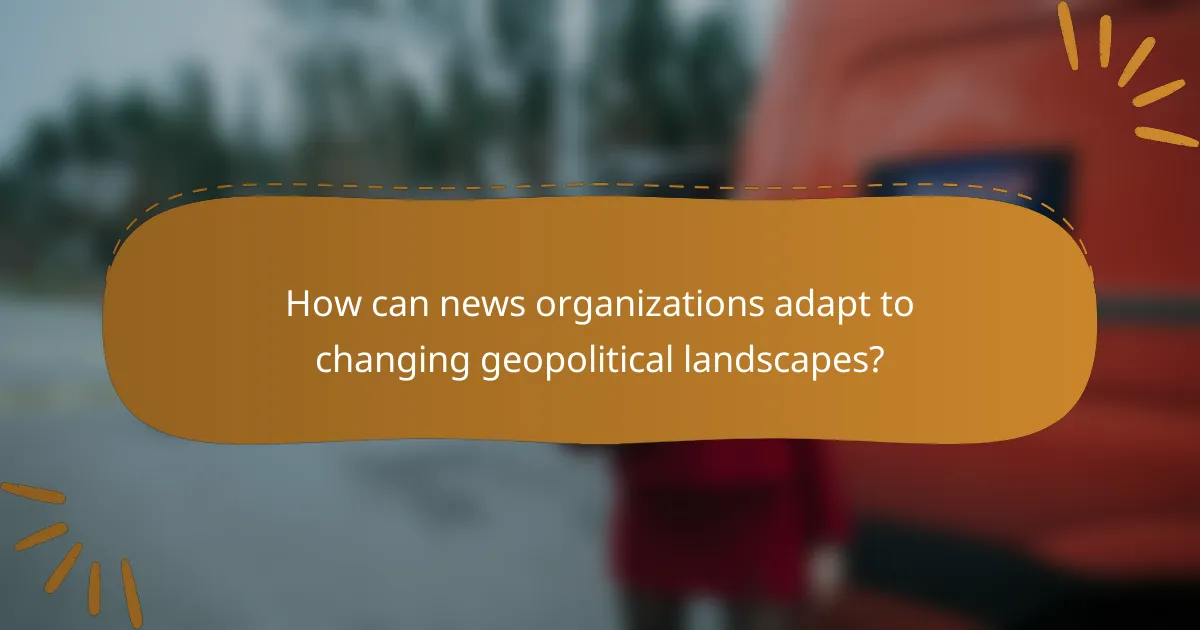
How can news organizations adapt to changing geopolitical landscapes?
News organizations can adapt to shifting geopolitical landscapes by employing flexible reporting strategies, prioritizing audience trust, and fostering collaborations with international journalists. These approaches help ensure that coverage remains relevant, accurate, and comprehensive in the face of evolving global events.
Strategies for balanced reporting
To achieve balanced reporting, news organizations should implement a diverse range of sources and perspectives. This includes engaging with local voices and experts from affected regions to provide context and depth to stories.
Additionally, employing fact-checking protocols and adhering to journalistic standards can enhance credibility. Regularly revisiting and updating stories as new information emerges is crucial for maintaining accuracy and relevance.
Building trust with audiences
Building trust with audiences requires transparency and consistency in reporting. News organizations should openly communicate their editorial processes and the sources of their information, allowing audiences to understand how stories are developed.
Engaging with audiences through social media and feedback mechanisms can also strengthen trust. Addressing concerns and correcting errors promptly demonstrates accountability and fosters a loyal readership.
Collaborations with international journalists
Collaborating with international journalists can provide valuable insights and broaden the scope of coverage. These partnerships can facilitate the sharing of resources, expertise, and local knowledge, enhancing the overall quality of reporting.
Establishing networks with journalists from different countries can also help news organizations navigate complex geopolitical issues. Joint investigations or co-reported stories can bring attention to underreported events and provide a more nuanced understanding of global dynamics.
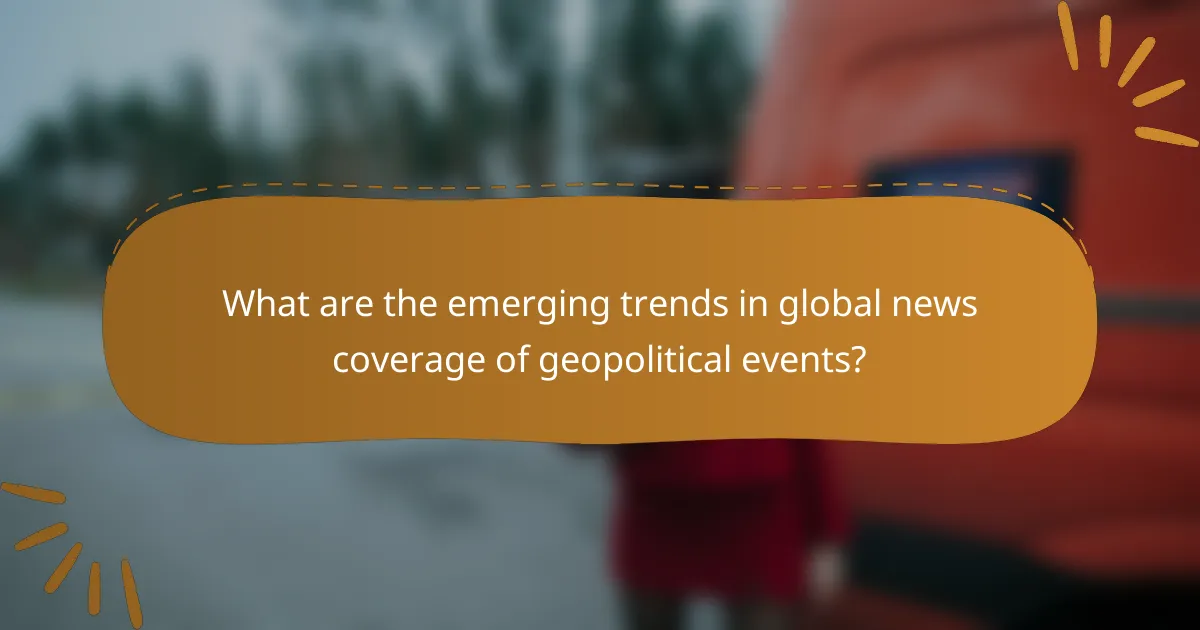
What are the emerging trends in global news coverage of geopolitical events?
Emerging trends in global news coverage of geopolitical events include the rise of independent media outlets, a heightened focus on climate-related conflicts, and the increasing use of data journalism. These trends reflect a shift towards more diverse perspectives and a commitment to providing in-depth analysis of complex issues.
Rise of independent media outlets
The rise of independent media outlets has transformed the landscape of global news coverage. These organizations often prioritize investigative journalism and provide alternative viewpoints that mainstream media may overlook. As a result, audiences gain access to a broader range of narratives surrounding geopolitical events.
Independent media can operate with fewer constraints, allowing them to cover sensitive topics such as government corruption or human rights abuses. However, they may face challenges such as funding limitations and potential censorship in certain regions.
Increased focus on climate-related conflicts
There is an increasing focus on climate-related conflicts in global news coverage, driven by the recognition that environmental issues can exacerbate geopolitical tensions. Journalists are now more likely to report on how climate change impacts resource availability, migration patterns, and national security.
For example, conflicts over water resources in regions like the Middle East and Africa are receiving more attention. This trend encourages news organizations to explore the interconnectedness of environmental and political issues, providing audiences with a more comprehensive understanding of current events.
Use of data journalism in reporting
The use of data journalism in reporting geopolitical events enhances the credibility and depth of news coverage. Journalists increasingly rely on data analysis to support their narratives, making complex issues more accessible to the public. This approach allows for clearer visualization of trends, such as migration statistics or economic impacts of sanctions.
Data journalism can also help identify patterns that may not be immediately apparent through traditional reporting methods. However, it is crucial for journalists to ensure the accuracy of their data sources and to present information in a way that is understandable to a general audience.
